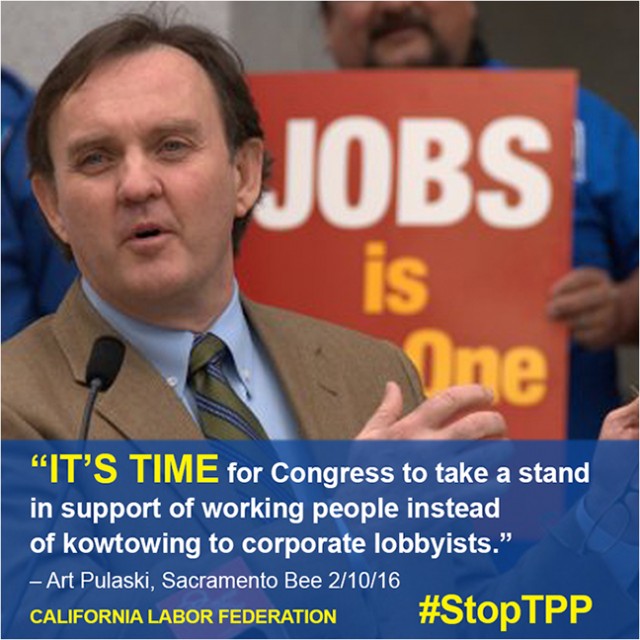 On Monday, West Sacramento Mayor Christopher Cabaldon, representing a fake astroturf group called the “Progressive Coalition for American Jobs,” penned a misleading op-ed in the Sacramento Bee in support of the job-killing Trans-Pacific Partnership (TPP). Cabaldon used a study from the Peterson Institute to help make his case that the TPP is good for jobs. Unfortunately for Cabaldon, he must not have actually read the study he cited because it actually says the flawed deal wouldn’t create any jobs AND it would lead to fewer good-paying manufacturing jobs.
On Monday, West Sacramento Mayor Christopher Cabaldon, representing a fake astroturf group called the “Progressive Coalition for American Jobs,” penned a misleading op-ed in the Sacramento Bee in support of the job-killing Trans-Pacific Partnership (TPP). Cabaldon used a study from the Peterson Institute to help make his case that the TPP is good for jobs. Unfortunately for Cabaldon, he must not have actually read the study he cited because it actually says the flawed deal wouldn’t create any jobs AND it would lead to fewer good-paying manufacturing jobs.
Today, California Labor Federation Executive Secretary-Treasurer Art Pulaski set the record straight with his own op-ed in the Bee, pointing out the many harmful effects of the deal.
Like every other recent trade pact, the TPP is chock-full of goodies for corporate special interests while woefully inadequate on labor and environmental safeguards. The chief problem that plagued deals such as the North American Free Trade Agreement is that labor standards were weak or unenforceable, encouraging corporate CEOs to move their operations to countries that pay meager wages in comparison to U.S. wages. NAFTA led to 700,000 jobs shipped overseas.
The TPP is no different. In fact, the Peterson Institute report that Cabaldon cites finds that the trade deal wouldn’t be a job creator for America, but would lead to 121,000 fewer manufacturing jobs by 2030…That’s a major red flag for anyone concerned about the future of our middle class.
Another recent study by the Global Development and Environment Institute at Tufts University paints a much bleaker picture. It projects that the TPP will lead to GDP contraction in the U.S. and job losses and increased inequality in all participating countries. Experts say the deal could also undermine California’s efforts to combat climate change, result in higher prescription drug prices and allow rampant currency manipulation by other countries.
Anyone who thinks this rotten deal will help address inequality in America clearly isn’t paying attention (or even worse, they’re drinking the corporate Kool-Aid). Bottom line, progressives like Bernie Sanders and Hillary Clinton are rejecting the deal. Conservatives are also blasting it, including Republican congressional candidate Scott Jones, who’s running against Rep. Ami Bera, who sold-out workers on last year’s fast track vote. The notion that Cabaldon and his bogus “progressive” coalition are supporting workers is laughable. Real progressives (as well as many other folks across the political spectrum) oppose the TPP and know from experience this deal will further gut out the middle class.
Pulaski:
The legacy of America’s broken trade policy is shuttered factories, outsourced jobs and a widening gap between the wealthy and everyone else. It doesn’t have to be this way. It’s time for Congress to take a stand in support of working people instead of kowtowing to corporate lobbyists. For the sake of our future, Congress must reject the TPP.
—

You must be logged in to post a comment.